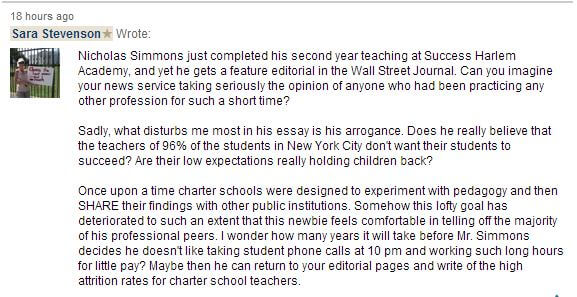Friday Freakout: Young Teachers’ Opinions Can’t Be Taken Seriously
Today’s freakout comes from the comments section of Nicholas Simmons’ recent op-ed in The Wall Street Journal entitled, “What I’ve Learned Teaching Charter Students.” Simmons has taught math for two years at New York City’s Success Academy charter school. In his piece, he shares about his students and their outcomes, but the ultimate messages are:
- “No one, especially without knowledge of [Success Academy students’] situation or home life or personal effort, has the right to undermine their remarkable achievements.”
- Stop fighting to shut down something that works, and “start believing that with the right changes, we can achieve these results for all New York City students.”
As we began scrolling through the comments section, we found people were impressed and, frankly, happy to hear the perspective of a non-traditional public school teacher (because charters are public schools). That is until…

There are many great responses to Stevenson on the original post, and we encourage you to read all of them. But, we thought it would be interesting to have a go at humoring her claims here.
1. “Can you imagine your news service taking seriously the opinion of anyone who had been practicing any other profession for such a short time?”
Here are a few, Sara Stevenson:
Pete Cashmore, founder of Mashable, was 19 when he started one of the most respected social, SEO, and online marketing advice blogs on the web. The website gets nearly 34 million unique visitors each month. We’d say everyone in that industry respects his opinion.
Shawn Frayne, founder of Humdinger Wind Energy was younger than 28 when he engineered a small device that can capture energy on bridges and other urban areas where wind turbines won’t fit. Pretty credible and respectable, we think.
Then there’s always Barack Obama. He became President of the United States after only three years’ experience as a U.S. senator.
2. “Does he really believe that the teachers of 96% of the students in New York City don’t want their students to succeed?”
Did he say that? Then, no he probably doesn’t. His piece speaks directly to the group of teachers out there that have been campaigning to have charter schools and school choice shut down for all, especially the ones who desire to misrepresent Success Academy students for their own personal gain.
3. “Once upon a time charter schools were designed to experiment with pedagogy and then SHARE their findings with other public institutions. Somehow this lofty goal has deteriorated to such an extent that this newbie feels comfortable in telling off the majority of his professional peers.”
Charter schools aren’t keeping their solutions under lock and key. Collaboration is a two-way street. Plus, it’s a bit presumptuous to assume the majority of public school teachers oppose alternatives to public school with such vigor that they will protest and actively campaign to take choices away from the very children who are benefiting from those choices.
4. “I wonder how many years it will take before Mr. Simmons decides he doesn’t like taking student phone calls at 10 pm and working such long hours for little pay? Maybe then he can return to your editorial pages and write of the high attrition rates for charter school teachers.”
Let’s assume he moves on after a few more years. That action doesn’t negate all the great work he did in his time there. It also doesn’t mean the children he leaves will decline. Regardless of the attrition rate among Success Academy’s teachers—which we don’t know—the high achievement of the school’s students hasn’t waned. In the end, Simmons’ professional career choices are his own. What is it about choice that people such as Stevenson can’t stand?
But the ultimate takeaway of this Friday Freakout should be that most of the comments were supportive—a rarity in the realm of online comments sections. This speaks volumes for the power of private, charter, and online teachers’ testimonies, which Americans don’t often get to hear. Most op-eds, blogs, and social media conversations on school choice are dominated by public school teachers, which is fine. Though typically those communications echo popular people’s opinionated opposition and mindfully-crafted rhetoric that is just not grounded in the facts.
More private, charter, online, home, and other specialized teachers, even young teachers, should feel encouraged to share their stories the way Simmons did—with supportive data, passion, and, most important, respect. As his story proved, many in the online community will embrace them.




